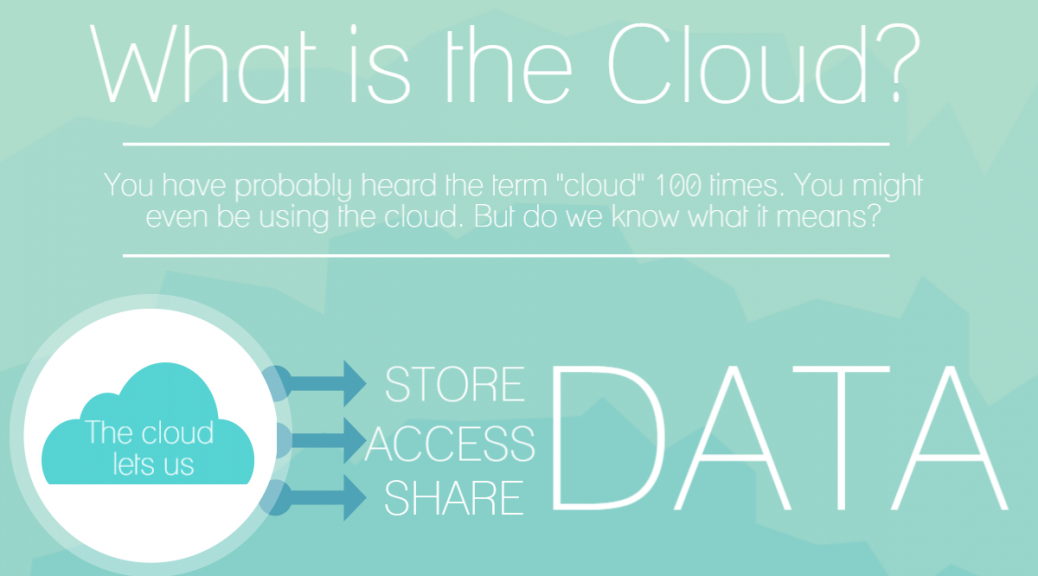If you read last week’s blog article What is the Cloud? then you should have a general idea of what we mean by “the cloud”. Which is great, but now you are probably wondering “so what?” This week we will be looking at why the cloud is important in general and in terms of business, by discussing some of its great benefits in terms of flexibility, performance, costs & security.
Flexibility
Universal Access
As we learned last week, the cloud is accessed online. So this means we can access the information we need anywhere in the world, at any time with nothing more than an internet-enabled device (like a laptop or tablet) and a working connection.

In business terms: This level of flexibility has been revolutionary to the world of business. People no longer need to be sat in the office to check in with work. They can tap into work whilst commuting, out on site or even holiday. Employees can log into a cloud system on their lap top in the morning and pick up from where they left off out on site in the afternoon on their smart phone. The cloud brings mobility to businesses.
Real-time Information
Any information that is managed and shared via the cloud updates in real time. This means that as soon as anything is created, saved or updated it is immediately viewable by anyone with access wherever they might be.
 In business terms: Critical business decisions can be made based on completely up-to-date and reliable information. Allowing businesses to respond faster to changes in their environment makes them more competitive in today’s global marketplace.
In business terms: Critical business decisions can be made based on completely up-to-date and reliable information. Allowing businesses to respond faster to changes in their environment makes them more competitive in today’s global marketplace.
Collaboration
The cloud connects people by allowing files of all types to be shared and co-edited on a multitude of devices, by storing them in a central location, accessible by everyone with permission. Files are not tied to the device they are created on.
 In business terms: Business associates from all corners of the globe can work together simultaneously on projects and see edits as they are being made. No more disconnected email trails, or files being saved and re-saved.
In business terms: Business associates from all corners of the globe can work together simultaneously on projects and see edits as they are being made. No more disconnected email trails, or files being saved and re-saved.
Performance
Fast Deployment
The cloud enables software to be used online via your browser. This means there are no lengthy downloads or complicated installation processes. You can get started immediately.
 In business terms: Time is precious and business owners don’t want to see valuable hours being wasted by planning in a software download for a new application. Software that is delivered via the cloud is different; it is designed to be used “out of the box” so businesses can get started instantly.
In business terms: Time is precious and business owners don’t want to see valuable hours being wasted by planning in a software download for a new application. Software that is delivered via the cloud is different; it is designed to be used “out of the box” so businesses can get started instantly.
Automatic Updates
If you subscribe to a service that operates from the cloud then you are not responsible for the upgrades. When new updates become available, the provider will often implement them without you even knowing. Cloud computing providers will also take care of routine server maintenance, including security patches.
 In business terms: In years gone by business would have to schedule in time to install upgrades to their business systems. Now, automatic updates means minimal disruption and minimal downtime. This is essential is today’s competitive environment.
In business terms: In years gone by business would have to schedule in time to install upgrades to their business systems. Now, automatic updates means minimal disruption and minimal downtime. This is essential is today’s competitive environment.
Maximises Efficiency
The cloud will save you time. At its very simplest, the cloud speeds things up because processes are mostly automated. It takes less people, less time to accomplish more work. In technical terms, cloud applications are designed to cope with fluctuation in bandwidth demands. This means that irrelevant of the number of people accessing a particular cloud service, no one will notice a drop in service.
 In business terms:: Business owners can reclaim their valuable time because using the cloud streamlines business processes. Things like handling invoices, that can often be very time-consuming, become quick and simple tasks. Cloud business systems can handle your business at its busiest without slowing you down.
In business terms:: Business owners can reclaim their valuable time because using the cloud streamlines business processes. Things like handling invoices, that can often be very time-consuming, become quick and simple tasks. Cloud business systems can handle your business at its busiest without slowing you down.
Environmentally Friendly
Using the cloud is environmentally friendly. Adopting the cloud instead of having your own on-site server means you are only ever using the server space you require. This results in reduced energy consumption as well as carbon emissions.
 In business terms: It is great for businesses to be seen to be actively reducing their carbon footprint but in doing this they will also be reducing costs. A business will require less hardware, see a reduction in the amount of raw materials such as paper required and will also be able to reduce their general energy costs.
In business terms: It is great for businesses to be seen to be actively reducing their carbon footprint but in doing this they will also be reducing costs. A business will require less hardware, see a reduction in the amount of raw materials such as paper required and will also be able to reduce their general energy costs.
Cost Efficiency
No Up-Front Costs
As a cloud service consumer there is no need to set up complex and expensive IT infrastructure to house any systems. Cloud service providers invest huge sums of money building safe and secure data housing networks. The benefits of this are passed directly onto the users without passing on the costs.
 In business terms: Businesses might not have the capital expenditure to invest in their own IT infrastructure. The cloud allows a business of any size to get up and running on a cloud system with zero capital expenditure. There is also zero risk as common practice for cloud business solutions is to offer a free trial.
In business terms: Businesses might not have the capital expenditure to invest in their own IT infrastructure. The cloud allows a business of any size to get up and running on a cloud system with zero capital expenditure. There is also zero risk as common practice for cloud business solutions is to offer a free trial.
Reduced Ongoing Costs
Standard practice for cloud solutions is “pay-as-you-consume” meaning users only have predictable ongoing operating expenses to consider but are never tied in to lengthy contracts. Users will benefit from free updates to the service and will never pay maintenance costs.
 In business terms: Businesses are able to source services on-demand according to their business needs. They can increase and decrease their cloud service usage according to budget and needs. You will never physically own the cloud solution you use but as all services are provided via the web at a fraction of the costs, you will never need to.
In business terms: Businesses are able to source services on-demand according to their business needs. They can increase and decrease their cloud service usage according to budget and needs. You will never physically own the cloud solution you use but as all services are provided via the web at a fraction of the costs, you will never need to.
Data Security
Enhanced Security
The security of any information that is stored, accessed or shared online is the service providers concern – which is a good thing because they are the experts. They are able to provide a greater investment in security infrastructure which allows them to constantly monitor and resolve security issues as they arise.
 In business terms: Businesses benefit from the security resources and skills offered by the provider of the cloud computing service they are using. Data centres can achieve physical security levels that far outweigh that of the average business.
In business terms: Businesses benefit from the security resources and skills offered by the provider of the cloud computing service they are using. Data centres can achieve physical security levels that far outweigh that of the average business.
Business Continuity
Data backups are a worry of the past. Cloud systems are not affected by fire, flood, theft or technology outage so you can rest easy in the knowledge that everything you store in the cloud is protected.
 In business terms: There is no need for complex disaster recovery plans as the cloud offers a level of data protection that all businesses can benefit from. Data is kept in a secure off-premisedata centre, so in the event of theft, loss or on premise IT failures etc. your business will not face the severity of implications it could otherwise. Thanks to the cloud – it will be business as usual.
In business terms: There is no need for complex disaster recovery plans as the cloud offers a level of data protection that all businesses can benefit from. Data is kept in a secure off-premisedata centre, so in the event of theft, loss or on premise IT failures etc. your business will not face the severity of implications it could otherwise. Thanks to the cloud – it will be business as usual.






 All the data you choose to send to the cloud will be stored on and accessed via multiple servers across multiple data centres: your email provider keeps your emails on their server; Apple keeps your iCloud files on their server, Facebook has their own server to store your data etc.
All the data you choose to send to the cloud will be stored on and accessed via multiple servers across multiple data centres: your email provider keeps your emails on their server; Apple keeps your iCloud files on their server, Facebook has their own server to store your data etc.